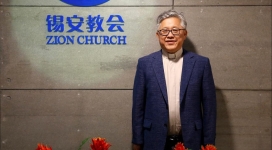
Last month, we told you about a story involving a Marquette University student who was allegedly told to drop an ethics class if he didn't approve of gay marriage. While not entirely that surprising or newsworthy on its own, the story was punctuated by the fact that the Wisconsin school is a Jesuit Roman Catholic university.
When the unnamed 20-year-old student approached his teacher, Cheryl Abbate, at the end of class to question a comment she made earlier dismissing the topic of gay rights, the student claimed that his concern was to address the fact that it's an important topic in which he should be able to voice his opinion.
The student is against gay marriage and felt that the teacher automatically assumed that every student in the class understood that gay marriage is perfectly acceptable to everyone.
"Regardless of why I'm against gay marriage, it's still wrong for the teacher of a class to completely discredit one person's opinion when they may have different opinions," the student said, according to the blog Marquette Warrior, run by Marquette University associate professor John McAdams.
"Actually," the teacher replied, "You don't have a right in this class, especially [in an ethics class], to make homophobic comments." The student claims to have recorded the conversation against the will of the teacher, and provided the recording to the Marquette Warrior blog.
But that's where some feel that the story was misinterpretted by McAdams in a "smear campaign" against Abbate. The teacher reports that she has been harrassed by a number of emails and a letter calling her a "tyrant," a "stupid, stupid woman," and a "toxic example to students," according to a blog post by Colleen Flaherty on the Inside Higher Ed website.
"Naturally, these e-mails are quite upsetting to receive but I have tried to remind myself that they do not reflect the person, philosopher, or instructor that I am," Abbate said.
The concern here is that Abbate's reputation as a graduate student may be tainted by these allegations from the student and McAdams' "one-sided attack." Justin Weinberg, associate professor of Political Philosophy and Ethics at the University of South Carolina writes in his own blog that "There are certainly interesting pedagogical questions about how to discuss potentially offensive topics without violating harassment policies."
Abbate has already said that McAdam's report failed to properly describe the context of the situation, making it seem like she was unfairly stifling the student's right to discussion for his beliefs. "Quite to the contrary, this class discussion was not meant to be an opportunity for students to express their personal beliefs about political issues."
"The event at the center of this controversy does not appear to be one of speech being shut down because it is offensive," Weinberg continues. "Rather, the [student's] comment was off-topic and based on false claims, and the instructor needed to make a decision about how to use limited class time, especially given the topic of the lesson and the subject of the course (which is ethical theory, not applied ethics) [...] In light of these factors, it is well within the rights and responsibilities of the instructor to manage classroom discussion in a way she judges conducive to learning."
Following this ordeal, the university has instilled a new anti-harrassment training session that encourages the school's employees to report anyone criticizing gay marriage to the human resources department.
As part of the training, a presentation is shown depicting a fictional situation where someone overhears co-workers discussing "their opposition to gay marriage." The video says that the discussion is harrassment, even though it was not directed at the offended party. "Hans' sexual orientation is also irrelevant; he does not need to be gay to be offended by his co-workers' discussion of same-sex marriage," the presentation stated.
University spokesman Brian Dorrington said that the training is in accordance with federal law and does "not necessarily equate to university policy. While its connection with the Abbate situation is unknown, Dorrington did expand on the issue by saying that the school is "taking appropriate steps to make sure that everyone involved is heard and treated fairly."




![[Exclusive] Watoto Asia Director Rev. Samuel Cheng: Bringing Life-Changing Education from Africa!](https://www.gospelherald.com/media/cache/thumbnail/7/23/72332sp_273w_150h_1x_1y.jpg)


